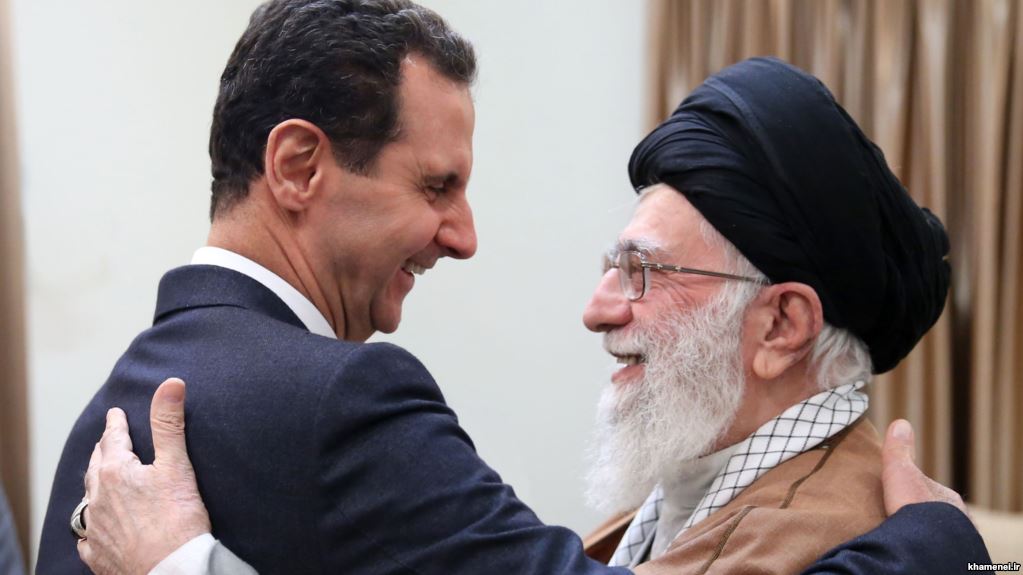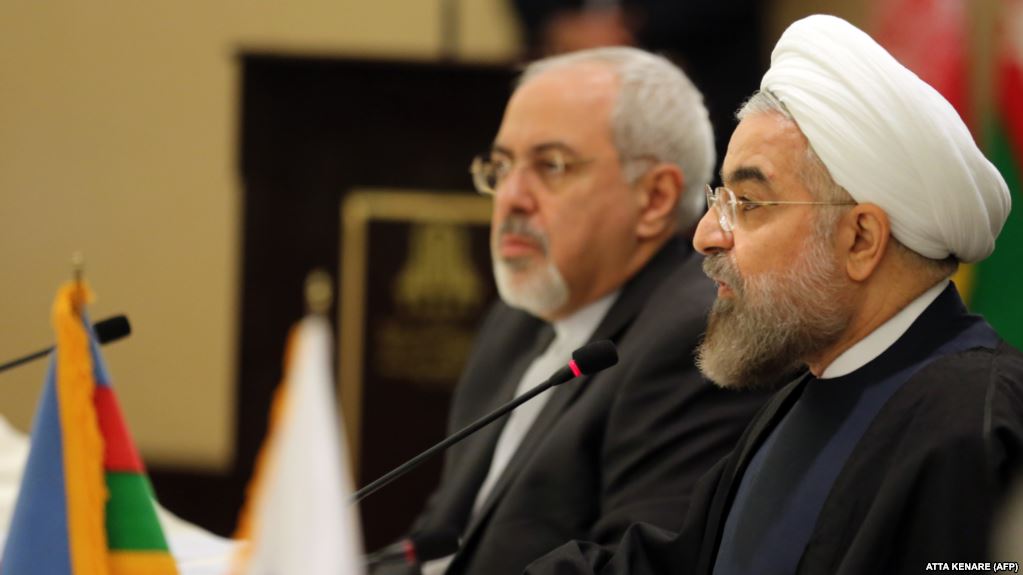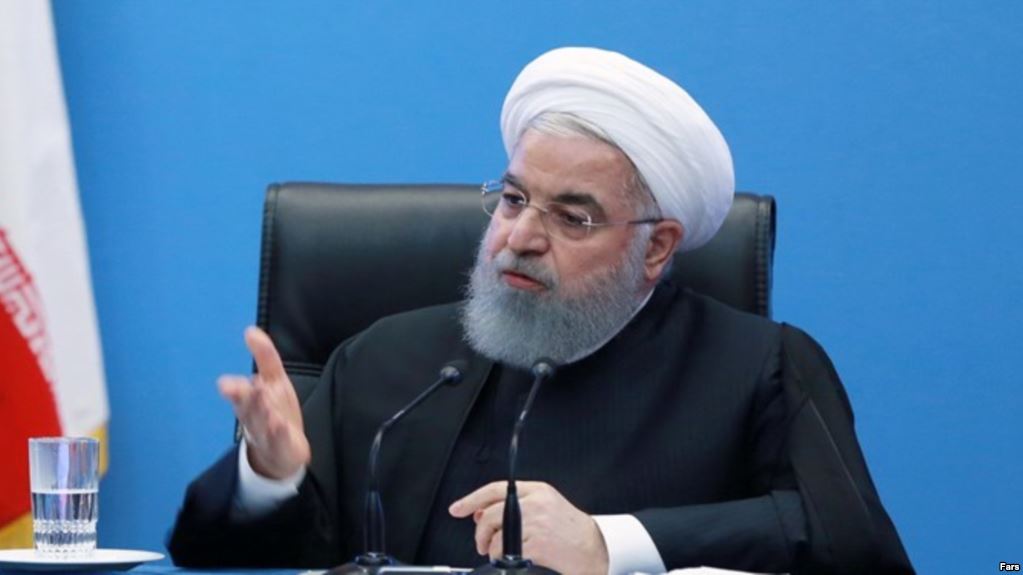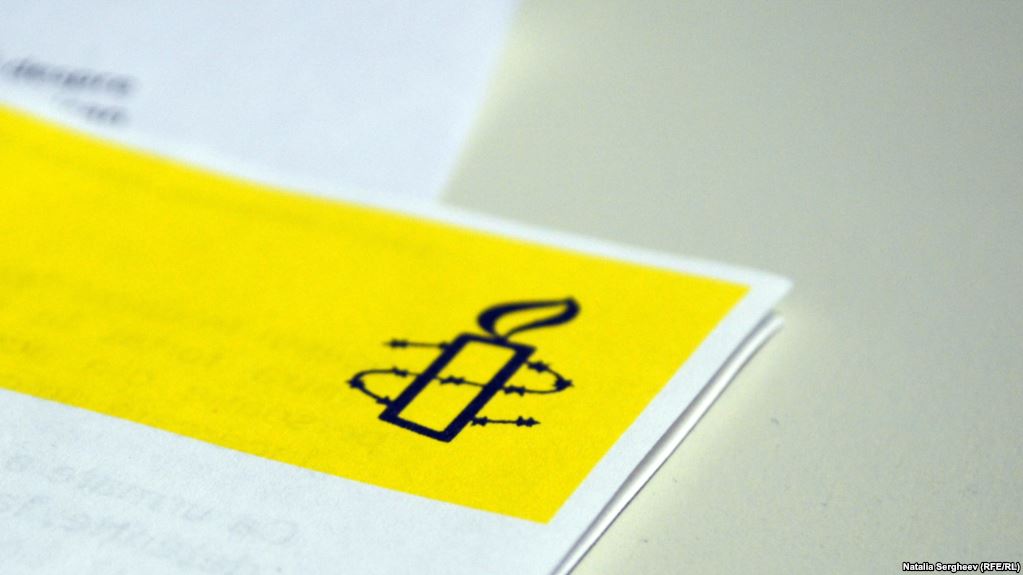![]()
Zarif’s Big Mistake
The editorial of Sedaye Eslahat newspaper deals with the recent resignation of Foreign Minister Mohammad Javad Zarif – which was not accepted by Hassan Rouhani – saying that the biggest mistake of Zarif and Rouhani’s government is that they do not talk to people about Iran’s realities in a transparent way.
The saying “the only good Indian is a dead Indian” is reflective of the approach of interest groups in Iran as for them the only good critic or diplomat is a dead critic or diplomat! Interest groups consist of those who get together to pursue certain interests, and they try to increase the possibility of attaining their goals by organizing themselves. Occasionally, interest groups are intent on passing laws and legislation for their own interests.
The editorial continues by saying that the mistakes of “reformists”, Rouhani’s government and Zarif have been to ignore the realities of governing in Iran. What is more, they think people will go to the ballot box. The interest groups are ready to overcome any obstacles to reach their own goals – be it economic, political or ideological.
The other big mistake of Zarif and Rouhani’s government was not to share the realities of the country with Iranians when they took charge of the country. Any government that depends on public support must certainly pay more attention to talking to people as well as to public opinion. Hassan Rouhani has implicitly said his government is “dumb”, which is true.
The editorial goes on to say that the government has talked very little to the people, losing its support that could have been used to confront those with excessive demands upon it. As such, the fact that the government doesn’t talk to its people is an injustice to them, while extremist groups – with little endorsement in society – speak louder and louder, making the voice of the majority less and less heard.
The editorialist holds that even though it is somehow late, the only way to save the country is to approach the people and well-intentioned critics.
Sedaye Eslahat – February 27
Iranian Statist-Economy is the Root of All Afflictions
The editorial of Arman Emrooz highlights the necessity of real privatization of Iran’s economy.
It seems that Iran’s economy suffers greatly from its ties with the government. It has been more than 250 years since the industrial revolution took place and free markets were introduced; during these 250 years, there has been not even one successful statist-economic experience. It failed China, Soviet Russia, Cuba, North Korea, Zimbabwe, and Iran.
The editorial goes on to say that it must not be forgotten that Iran’s economy was statist even before the revolution as well; the only difference is that it has become more government dominated due to confiscations that took place after the revolution. All countries that have achieved significant economic successes such as India, China, Malaysia, Turkey, Indonesia, Brazil, Argentina, Mexico, and Singapore discarded the statist-economic approach and adopted a free market economy.
The Iranian government’s economic policy is the root of all predicaments. We can ask how come that in Turkey, India, Japan, Norway, Brazil, and Argentina, there are no such things as a king of sugar, meat, and gold coin, whereas such problems only exist in Iran? Why aren`t there cases of economic corruption in free market economies as much as there are in Iran? The essential problem goes back to the Iranian government’s state-led economic policies.
The editorial adds that Hassan Rouhani is right when he says the semi-private economy is the same as the government one. A company or a factory that previously belonged to the government has been privatized. However, it doesn’t mean that its shares can be bought in the free market by the private sector; it means one of the government banks has bought all the shares. That is why companies like Ahvaz Steel and Haft Tapeh Sugar Cane companies, which were government companies, are now making losses.
In the end, the editorialist holds that Iran has no other way but to follow the path of the countries that have been successful in this regard, as Iran’s economy has no solution but to become non-governmental.
Arman Emrooz – February 26
The necessity of Understanding International Mechanisms
The editorial of Setareh Sobh newspaper deals with why the Islamic Republic must sign FATF bills, as the survival of the nation and the country depends on it.
The government is trying to take steps for ratifying FATF bills – something that other countries have done. The truth is that there are regulations in the international community that are necessary for having a financial and commercial relationship with the world. The international order has changed since the past decades – a thing that is not understood by some people in Iran. Without understanding the new order, nothing will be gained but more pressure on Iran.
The editorialist holds that the government has understood the current situation – with Hassan Rouhani saying whether good or bad, there is no way but to accept FATF’s framework. Were all cases accepted in the past good? Was the UN Resolution 598 to the advantage of Iran when it was accepted? When during the JCPOA the Islamic Republic showed flexibility and accepted to curb its nuclear activities, was it good? It is not about good or bad; it is about the survival of the nation and country.
The point is in diplomacy, one must cave in at some junctures so that we can take big steps later. Currently certain crises have come into existence, but apparently, certain people don’t want to see them. Iranian officials and authorities must realize this and not impose more unnecessary costs on the people.
The editorial concludes by saying that Iran currently is like a patient in need of medication – no matter how bitter it is – to stay alive. Today it is all about the survival of the nation, and national interests must not be put at risk for factional interests.
Setareh Sobh – February 25
Fallouts from Mere Words!
Hassan Rouhani’s speech in which he said the smuggling of meat from Iran is due to it being inexpensive went viral among the people and the media. The editorial of Mostaghel newspaper deals with consequences of the Iranian President’s speech, suggesting he should apologize to the public for it.
Iranian people are following the details of economic issues under the current economic crisis and existing difficulties to make ends meet: they all know that the increase in the foreign currency rate by the government has resulted in a decrease in the value of the national currency. As a result of discrediting the national currency, the goods lost their values, thus making smuggling goods to other countries profitable.
The editorial continues by stating that when the Iranian President interpreted the smuggling of goods because of their cheap value in the country, he added insult to injury. What Rouhani said is not acceptable to the elites and it became a subject of ridicule and mocking on the internet by the public. It must be admitted that the time is over for mere words and covering mismanagement and mistakes by giving speeches and blaming foreigners. Iranian statesmen must be honest in their speeches and behaviors.
Continuing the mere words and trying to show an inverted image of the situation – particularly at a time when society is well aware of what is going on – is a terrible insult against the people which can be very dangerous, as it can damage the government’s prestige.
In the end, the editorial suggests that Hassan Rouhani must once again deal with this issue honestly and apologize to the Iranian people, in order to promote political trust between the government and the people.
Mostaghel – February 24
![]()
Bashar Al-Assad visits Tehran

The Syrian President Bashar Al-Assad, in an unannounced trip, went to Tehran and met separately with the Iranian Supreme Leader Ali Khamenei and President Hassan Rouhani. Bashar hasn’t visited Iran since the beginning of the protests in 2011 and the ensuing civil war in Syria. Qassem Soleimani, the Commander of the IRGC Quds Forces, was present in both meetings.
In the meeting, Khamenei asserted that Iran and Syria are “strategic depth” for each other, went so far as to call Assad “the hero of the Arab world”.
Critics of the Islamic Republic say that Iran’s interference in Syria and it suppressing peaceful protests of Assad’s opponents resulted in creating military conflicts in this country.
Khamenei, in this meeting, also called the plan for the creation of a “buffer zone” in Syria as a “dangerous conspiracy” by America, saying that it must be rejected and resisted. Turkey has called for creating a buffer zone in northern Syria with the logistical help of America and its allies in order to evacuate Syrian Kurdish forces.
Assad also had a meeting with Hassan Rouhani. The Iranian President announced Iran’s readiness to participate in the process of reconstructing Syria. In recent years, Iran has made many financial aid contributions to Syria, including creating two credit lines of $1 billion and $3.6 billion for exporting goods to this country.
Earlier, Yahya Rahim Safavi, the special aide in military affairs to the Supreme Leader, had said in a speech that Iran’s expenses in Syria should be reimbursed through gas, oil and phosphate mines.
Many Arab countries, which had a tense relationship with Syria during the past eight years, have recently reopened their embassies in Syria and have made it clear that they are also after economic opportunities during the reconstruction era in Syria – something that has somehow upset Iran.
Iran’s interference in Syria and backing Assad have instigated extensive criticisms in Iran of the Iranian regime. In last year’s protests in more than 100 cities in Iran, many demonstrators who were angry at the Islamic Republic’s foreign policy chanted: “Let go of Syria! Think about us!”
Some political activists in Iran strongly have criticized the performance of Qassem Soleimani and the IRGC Quds Forces in the region, saying that the creation of ISIS is because of Soleimani’s mismanagement. Mehdi Khazali, a political activist, had said that if it wasn’t for Qassem Soleimani’s presence in Syria, there would be no ISIS in that country now.
As a result of the Syrian civil war since 2011, hundreds of thousands of people have been killed and millions of people displaced.
ISNA
Radio Farda
Rouhani Rejects Zarif’s Resignation: The Show Must Go on!

The Iranian President Hassan Rouhani rejected Zarif’s resignation, explaining that he sees it against the country’s interests. He also explained that he had agreed with Zarif to preserve the credibility of the Foreign Ministry and the position of the foreign minister to implement the country’s foreign policies.
Zarif had announced his resignation after the Syrian President Bashar Al-Assad went to Tehran and met with both Iran’s Supreme Leader and the President, in both of which he was not present.
In the letter rejecting Zarif’s resignation, Hassan Rouhani said he was aware of the pressure against Iran’s diplomatic apparatus, hoping that these “tough conditions” would happen to pass as well. He noted the “cheerfulness of opponents” of the Islamic Republic, like the Israeli government, was a sign of Zarif’s success.
The Israeli Prime Minister Benjamin Netanyahu had said in reaction to Zarif’s resignation: “Good riddance!”
Nevertheless, Zarif’s resignation instigated reactions in and out of Iran.
Some analysts attributed it to Bashar Al-Assad’s trip to Tehran and his meeting with Ali Khamenei, seeing it as a sign that the Iranian regime cannot even control the behavior of its officials. They explained that Zarif’s resignation points to a gap that exists within the Iranian establishment.
Some cited interferences of Khamenei and Ali Akbar Velayati – his Senior Advisor in Foreign Affairs – as the cause of the resignation, while others talked of existing problems within the government. Meanwhile, others tied Zarif’s resignation to not ratifying FATF’s bills that have been stalled by Iran’s Expediency Council.
Other political observers saw Zarif’s resignation as a wake-up call for the entire Iranian establishment, as the policies taken by the Supreme Leader – in the region and the world – have created an economic and political crisis in Iran. They suggested Hassan Rouhani, too, must follow suit and resign from his position.
The US Secretary of State Mike Pompeo, too, reacted to Zarif’s resignation in a tweet: “We note Zarif’s resignation. We’ll see if it sticks. Either way, he and Hassan Rouhani are just front men for a corrupt religious mafia. We know Khamenei makes all final decisions. Our policy is unchanged – the regime must behave like a normal country and respect its people.”
BBC Persian
VOA Persian
Rouhani: The Armed Forces Must Let Go of Iran’s Economy; Astan Quds Razavi to Pay Taxes

The Iranian President Hassan Rouhani, in a recent speech, pointed out to the interference of the military in the economic affairs in Iran, saying that it must let go of the economy. He urged that the Iranian Supreme Leader is also against the armed forces’ interference in the field of economy.
Political activists and economic observers have repeatedly criticized the dominance of the military over Iran’s economy during Ali Khamenei’s leadership.
In his speech, Rouhani also slammed Iran’s semi-governmental economy, adding that in Iran no one even dares to monitor semi-governmental companies. According to Iran’s President, neither the people nor the government knows much about such companies.
The so-called semi-governmental companies in Iran enjoy the support of institutes like Astan Quds (a charitable foundation), Mostazafan Foundation, Foundation of Martyrs and particularly Iran’s military forces. According to economic observers, they force the government to give them concessions, without seemingly having any shares in the public budget.
Wrong economic policies in recent decades have created a kind of zero-sum situation in Iran’s economy in which the winners are those who have been close to the main circle of political power. Meanwhile, the losers have been mainly the people who have paid the price of such an economy with double-digit inflation, increasing unemployment and a decrease in purchasing power.
Moreover, Iran’s parliament has passed a bill based on which a number of institutions are required to pay taxes, including Astan Quds Razavi, Execution of Imam Khomeini’s Order or EIKO, as well as economic institutions linked to the IRGC and to other military affiliates.
The aforementioned institutions had evaded paying taxes since the beginning of the Islamic Republic’s establishment. Hassan Rouhani’s administration has repeatedly criticized those institutions for tax evasion.
This bill was approved in parliament due to the budget deficit and economic crisis in the country.
A large part of companies, institutions, and economic foundations under the Supreme Leader are exempted from paying taxes to the government.
Astan Quds Razavi, along with the IRGC’s Khatam al-Anbiya Construction Headquarters and NAJA Cooperation Foundation (related to Iran’s police), are three main economic giants in Iran.
Numerous companies and economic institutions, which are subsidiaries of Astan Quds Razavi, are active in various fields including textiles, automobiles and construction industries as well as pharmaceuticals and agriculture, among others.
Radio Farda
RFI
Poor Human Rights Conditions in Iran

Amnesty International published its annual report on human right conditions in Iran, highlighting that in 2018, the conditions of human rights in Iran worsened.
This report has 11 chapters on different issues in Iran, including: freedom of speech, associations and assemblies; arbitrary detention and imprisonment; media freedom; house arrest of the Greem Movement’s leaders in 2009; torture and other ruthless behavior; freedom of religion and conviction; discrimination against women and girls; discrimination against ethnic groups; workers’ rights; and capital punishment.
Meanwhile, Iran’s Human Rights Organization (IHRO), too, issued its annual report, declaring that it has managed to confirm that as Iran enters the 4th decade of the Islamic Republic, since the revolution there have been approximately 6000 cases of executions in the country. This report studying executions in 2018 in Iran announced that there were at least 273 executions in Iran, showing a 48% reduction compared to the year before.
According to this organization, whereas the Islamic Republic’s officials announced only 34% of executions, IHR has managed to confirm the rest by its own sources in Iran.
The IHR has accused Iranian judiciary officials of systematic violations of the right to fair prosecution and trial, adding that many confessions of suspects have been obtained through pressure and coercion, and then the confessions have been used against the suspects during their trials.
Radio Farda
Radio Farda
